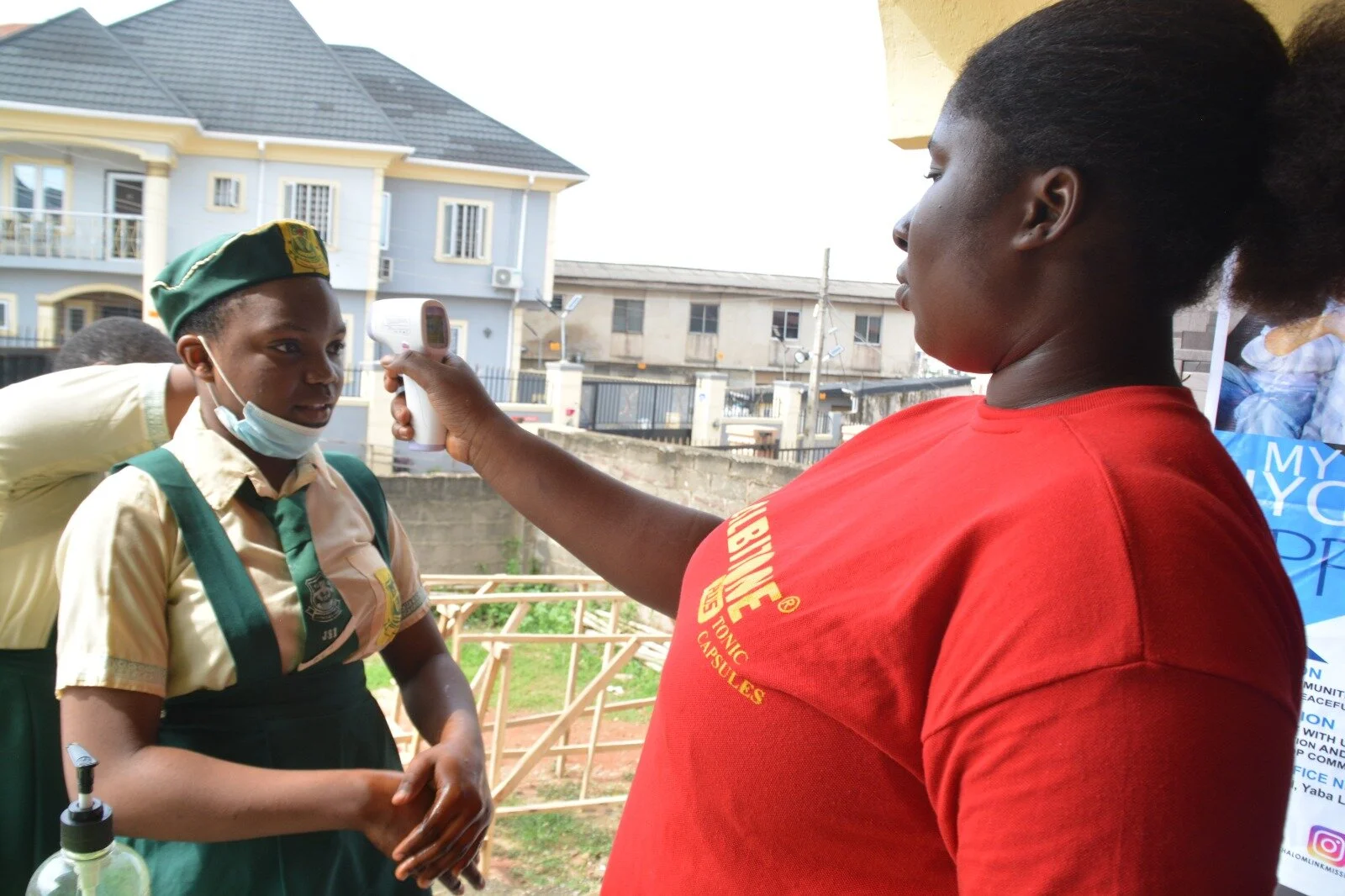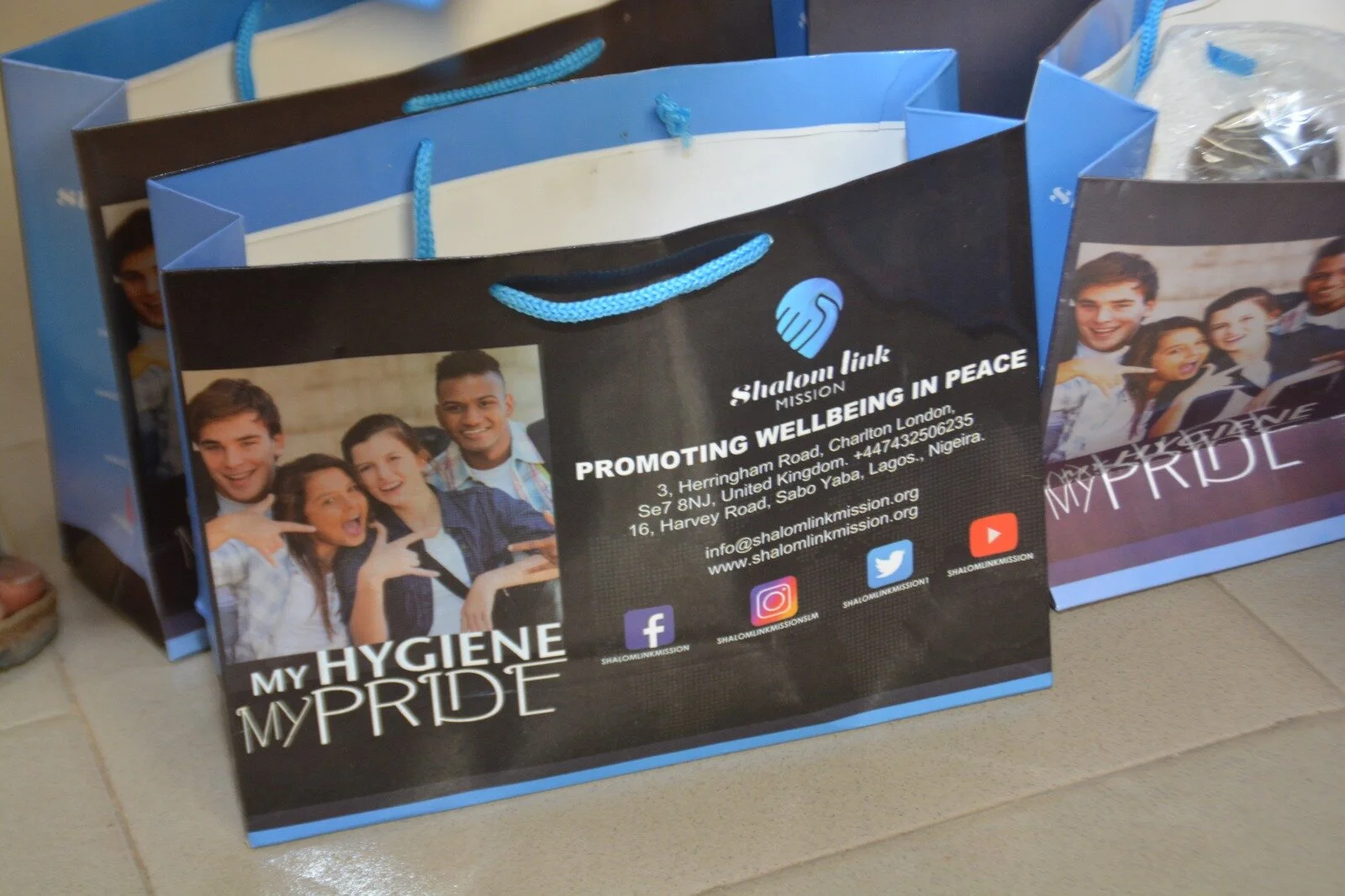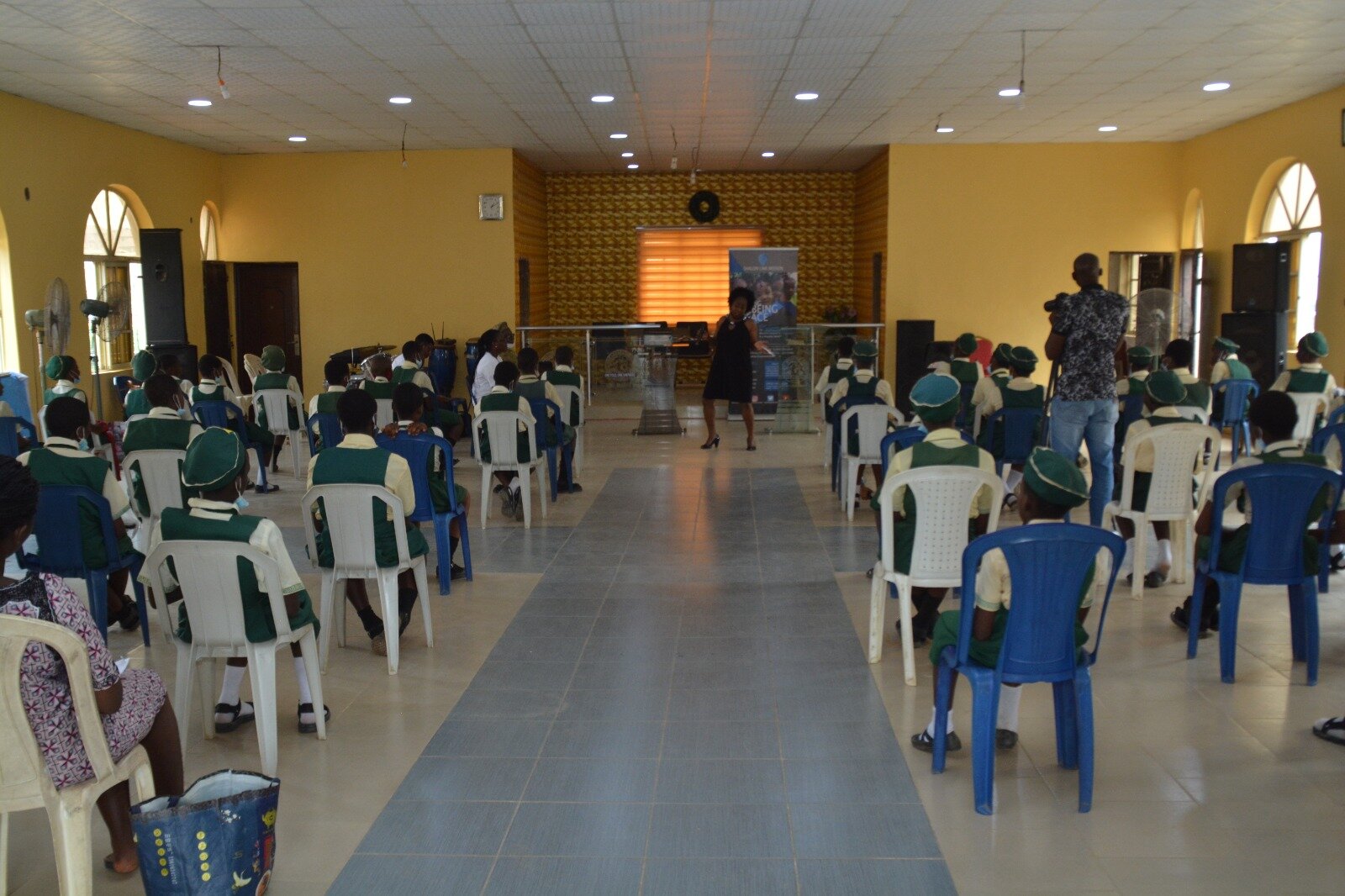PERSONAL HYGIENE AND PROMOTION (PEH-HEP) PROGRAMME
Report Of Personal Hygiene and Promotion (PEH - HEP) Program Held At The Church Auditorium, Christ Apostolic Church, #18 Kunle Olaleye Street, Victory Estate, Ojodu Berger, Lagos State On Wednesday, 16th June 2021.
Organization Background:
Shalom Link Mission is a charity/non-profit organization dedicated to improving the health, education and human welfare of families in deprived communities.
Vision:
To build communities with healthy children and families in a peaceful world.
Our Mission:
Reaching out with unique values to promote wellbeing, quality education and peace for meaningful living in underdeveloped communities.
The outcome of the Personal Hygiene and Promotion (PEH-HEP) Program are as follows:
. Increase awareness of the menstrual cycle & hormonal changes associated with puberty.
▪ Health .re-orientation and healthy behavioural initiatives.
▪ Increase personal hygiene, attitudes and practices.
▪ Equip and expose participants to gender-sensitive hygiene materials.
Event Background
In line with the above-mentioned outcomes, the third edition of the Personal Hygiene and Promotion (PEH-HEP) program tagged: ‘My Dignity, My Pride’ was held on Wednesday, June 16th 2021. This is a teen-empowerment initiative of Shalom Link Mission founded by Grace Modupeola Akinyemi.
Event Location:
The Church Auditorium, Christ Apostolic Church, #18 Kunle Olaleye street, Victory Estate, Ojodu Berger, Lagos State.
Mobilization
The following approaches were to mobilize participants for the event; ▪ Invitation letter.
▪ Phone calls.
▪ E-mails.
▪ Text and chat messages. ▪ Word of mouth
The process of mobilization involved:
Compilation of contact details of secondary school, speakers and other identified
stakeholders.
Distribution of invitation letters to participating schools, speakers and other stakeholders.
• Sending emails, text messages, and phone calls to all invitees as a form of reminder.
Shalom Link Mission
Target Group(s):
Fifty (50) Secondary School Students, selected from Ojodu Junior Grammar School.
Participation:
The following school(s)/groups/NGO’s/Stakeholders’, etc. were in attendance:
Teachers representing: Mrs Bola Lawal (Counsellor of District VI). Mrs Olubummi Olatunde (School Counsellor).
Speakers/Facilitators:
Grace Ashiwel.
Anthonia Adepoju.
Joy Adekoya.
Kafayat Salami.
Tobi Ayediran.
Akin Adelakun.
Thomas Dagwat Christian.
Roseline Onakurayie.
Civil Society Organizations/NGOs:
Giving is Healing Foundation.
Hands of Joy.
Rescue Africa Village initiative.
Proceedings
The Personal Hygiene and Promotion (PEH-HEP) program took the following sequence of activities.
Arrival/Registration
The arrival and registration of participants at the programme venue started at about 10.30 am. The event officially commenced at 11:05 am with the introduction of invited schools, teachers, guests, speakers and stakeholders. This was followed by opening prayers led by Anthonia Adepoju and a rendition of the Nigerian national anthem.
Opening Remark:
In her opening remark, the principal of Ojodu Junior Grammar School expressed gratitude to the convener for putting together an event that would promote healthy habits and lifestyles amongst teenage girls. She also encouraged the convener to increase the number of invited schools and participants in subsequent programmes. She advised the students to consider their invitation and attendance of the event as an opportunity to learn, become better and impact their peers positively with the knowledge gained.
Welcome, Address:
The welcome address was delivered by the founder of Shalom Link Mission (SLM) and convener of the Personal Hygiene and Promotion (PEH-HEP) Program, Grace Modupeola Akinyemi. In her welcome address, the convener described Shalom Link Mission as a not-For-Profit organization devoted to improving the health, education and human welfare of families. She listed the core values of the organization as child health, personal hygiene, mental health, quality education, family wellbeing and promotion of peace. The convener shared her first mensuration experience growing up as a disadvantaged and uninformed teenage girl with the participants. In her words,
Shalom Link Mission
“You are made for a purpose. You are created to fulfil something. Gold is never beautiful in its raw state. You may think it isn’t beautiful, but it is. Before the beauty of gold is revealed, it must undergo a process. Though it might be slow, you will surely get there. You are gold in the making. Trust the process.”
She declared to the participants that there are opportunities and resources for success all around them. She identified the Personal Hygiene and Promotion (PEH-HEP) program as one of such opportunities and platforms that would is positioned to bridge the information gap between growing teenage girls and womanhood. Finally, she advised the participants to get the best out of the training programme.
Special Performance:
The welcome address was followed by a short special spoken word poetry presentation by Grace Ashiwel.
First Presentation
The first presentation titled: ‘Puberty Changes in The Body’ was delivered by a community, Anthonia Adepoju. She described puberty as the stage of life when a child's body undergoes a process of physical changes and matures into an adult body capable of sexual reproduction. She stated that both girls and boys experience puberty. The speaker explained the changes that happen/take place in a young girl during puberty. She divided the signs of puberty in girls into two and listed them as follows:
The first sign of puberty in girls is usually that their breasts begin to develop. It's normal for breast buds to sometimes be very tender or for one breast to start to develop several months before the other one.
Pubic hair also starts to grow, and some girls may notice more hair on their legs and arms.
Girls' breasts continue to grow and become fuller around 2 years after beginning puberty, girls usually have their first-period pubic hair becomes coarser and curlier underarm hair begins to grow. Some girls also have hair in other parts of their body, such as their top lip,
and this is completely normal.
Girls go through a growth spurt – from the time their periods start, girls grow 5 to 7.5cm
(2 to 3 inches) annually over the next year or two, then reach their adult height.
Most girls gain weight as their body shape changes – girls develop more body fat along their upper arms, thighs and upper back; their hips grow rounder and their waist gets
narrower.
She stated that puberty usually starts in girls between the ages of 8 and 13 years old. While boys begin puberty between the ages of 9 and 14 years. She emphasized that puberty is initiated by hormonal signals from the brain to the gonads: the ovaries in a girl and the testes in a boy. She also remarked that every girl and boy child begin puberty when their body is ready and grow at different paces. Anthonia Adepoju advised the participants to stay away from the opposite sex to avoid getting pregnant. The first speaker concluded her presentation with these words, “Never let anyone take advantage of you. Love yourself. Believe in yourself. Don’t give in to peer pressure. Zip up.”
Joyce Adekoya delivered the second presentation titled: “Personal/Self-Care.” The speaker commenced her session with these words, “There is nobody in this world that didn’t come from a woman. Each and everyone that is here today carries awesome virtue inside you.” She defined self-care as providing adequate attention to one's own physical and psychological wellness. The speaker highlighted the following:
Shalom Link Mission
▪ Self-care means maintaining your confidence.
▪ Self-care means maintaining your dignity.
▪ Self-care means maintaining your pride.
▪ Self-care means taking yourself so you can be healthy.
She itemized the following as ways adolescents could take care of themselves:
▪ Acquire knowledge because knowledge is power. ▪ Prepare – Preparation is key for puberty.
▪ Know your body and look out for signs.
▪ Be observant.
The speaker also listed the signs and symptoms of menstruation as follows:
▪ Acne.
▪ Abdominal bloating.
▪ Soreness in your breasts.
▪ Back pain.
▪ Constipation.
▪ Fatigue (Feeling more tired than usual). ▪ Moodiness.
▪ Clear or white vaginal discharge.
Joyce Adekoya rounded off her presentation with tips on maintaining a healthy body: “Exercise regularly, eat healthily, get enough sleep, put on clean underwear and clothes every day, use a good deodorant and make sure to brush your teeth at least twice a daily.”
The third presentation on “Drug Abuse Use and Prevention” was delivered by Akin Adelakun. The speaker inspired the participants with the story of his addiction to drugs. He narrated how his friends influenced his choice of abusing drugs while growing up as a teenager. He shared how he experimented with various substances, suffered a mental breakdown and was eventually admitted to a rehabilitation centre for treatment. The speaker identified inaccurate Information about the dangers of drugs, lack of parental supervision and family Background, the prevalence of drugs in the community, peer influence and curiosity as some of the reasons why young people abuse drugs. He mentioned truancy, Loss of Interest in schoolwork, health-related Problems including mental disorder, criminal activity, violence and lawlessness as some of the consequences of drug abuse. He ended his session by advising the participants to choose their friends wisely, avoid negative peer pressure and lead a life free of drugs.
The third presentation titled: “Safeguarding the Girl Child” was presented by a social worker, Kafayat Salami. She shared sexual abuse stories involving young girls with the participants. The speaker itemized various ways young girls can/could keep themselves safe from sexual abuse. Excerpts from her presentation include:
“Rape is a common form of sexual assault. It is committed in many situations - on a date, by a friend, an acquaintance, or when you think you are alone. Educate yourself on “date rape” drugs. They can be slipped into a drink when you aren’t not looking. Never leave your drink unattended - no matter where you are.”
“Try to always be aware of your surroundings. Date rape drugs make a person unable to resist assault and have a type of memory loss so the victim doesn’t know what happened.”
Shalom Link Mission
The speaker highlighted the following as ways girls could safeguard themselves against sexual assault:
▪ Speak up – Talk to your teacher, school counsellor, trusted or responsible adult. ▪ Avoid being alone with people you do not know or do not trust.
▪ Be aware of where you are and what is around you.
▪ Stay away from deserted areas.
▪ Try to appear strong, confident, aware, and secure in your surroundings.
The speaker enumerated the following as the five personal safety boundary rules for every girl child:
No one should look at the private parts of your body.
No one should ask you to look at the private parts of their body.
No one should touch the private parts of your body.
No one should ask you to touch the private parts of their body.
No one should show you pictures of private parts on the TV, in magazines, on the computer
or on a cellphone.
Kafayat Salami concluded her presentation with these words, “Menstruation is your pride. Menstruation is your ticket to womanhood. I want you to know today that the only weapon an abuser has over you is your voice. Speak up.”
The fifth presentation titled: “Migration” was presented by Tobi Ayediran. The speaker defined migration as the movement of either people or animals from one area to another. He explained that the world population is growing rapidly. Environmental and economic factors affect population density, distribution and structure. Migration has positive and negative effects on a country or area. The speaker also highlighted the cause and effects of migration. Excerpts from her presentation include:
“Migration is the movement of people from one permanent home to another. This movement changes the population of a place. International migration is the movement from one country to another. People who leave their country are said to emigrate. People who move into another country are called immigrants. The movement of people into a country is known as immigration.”
“Every year some people leave the UK and move abroad. At the same time, some people will move into the UK. Immigrants add to the total population and emigrants are subtracted from the total.”
“Sometimes people just move from one region to another within the same country. In many developing countries, large numbers of people have moved from the countryside to the cities in recent years. This is called rural to urban migration.”
‘Sometimes people have a choice about whether they move, but sometimes they are forced to move. The reasons people leave a place are called the push factors. The reasons people are attracted to new places to live are called the pull factors.”
“Migration can bring advantages and disadvantages to the country which is losing people and also to the host country. Another type of migrant is an asylum seeker, someone who has been forced to leave their own country because they are in danger, e.g fleeing as a result of their religious beliefs or the danger of war.”
Shalom Link Mission
Tobi Ayediran concluded his presentation by encouraging the participants to take their destiny into their hands and make the most of their life.
The sixth personation titled: “Purpose Discovery” was delivered by Thomas Christian. The speaker defined purpose as
He stated that
He described the equation for purpose as: G + P + V = P (Gifts + Passions + Values = Purpose). Excerpts from
Thomas Christian’s presentation:
“The youth population is growing. Crime in society is also growing. An estimated 10.5 million children between the ages of 5 – 14 years old are currently out of school.”
“You can’t just copy and paste other people’s purpose. You have to discover your own purpose in life. To become a solution to Nigeria’s problem and world’s challenges, you must find your purpose.”
He remarked that people find purpose through their passions, gifts and personal cravings. He shared the story of Malala Yousafzai the Pakistani female activist and Nobel laureate who became an international symbol of the fight for girls’ education after she was shot in 2012 for opposing Taliban restrictions on female education in her home country of Pakistan. Thomas Christian concluded his presentation by encouraging the participants to pursue their passion, get involved in what they love doing, develop their gifts and skills and strive to make a positive difference in their life.
The training sessions were rounded off with a short presentation by Roseline Onakurayie. She shared her experiences while growing up as a teenage girl with the participants. She advised them to make the most of their teenage years. Excerpts from her presentation:
“Knowledge is power. Runaway from myths. Information is all around you. It’s a click away. Find out.”
“Don’t be deceived by anyone. It’s your body. Own it. Carry yourself with poise.”
“Only you will be your worse enemy. You can be all you want to be. The choice is yours.”
Question and Answer Session
Sufficient time was provided for the participants to ask relevant questions as well as share lessons learned from all the presentations. A feedback form was also handed out to all the students.
Refreshments, Gift Presentation and Pictures
All the students were presented with the SLM gift packs. Group photographs by all the participants with the convener and founder of Shalom Link Mission - Adeyinka Grace Akinyemi. Distribution of well-packaged food, bottled water and drinks to revitalize the participants was managed by the SLM support team.
the reason for which something is done or created or for which
something exists.
the purpose is about recognizing gifts and using them to contribute to
the world. The gift could be playing beautiful music for others to enjoy, helping friends solve
problems, or simply bringing more joy into the lives of those around you.
“Having a purpose in life is one of the fundamental factors of happiness. Without it, you will live
your life less focused and less efficient.”
Shalom Link Mission
Closing Remarks, Vote of Thanks and Closing prayers
The third edition of the Personal Hygiene and Promotion (PEH-HEP) program was concluded at 2:10 pm with a vote of thanks by the convener and closing prayers offered by Ademola Adepoju.
Conclusion
At the end of the highly inspiring and interactive training, it was obvious that the program was a vital learning and enlightenment opportunity on adolescent health for all the participants.
Shalom Link Mission
Shalom Link Mission



































